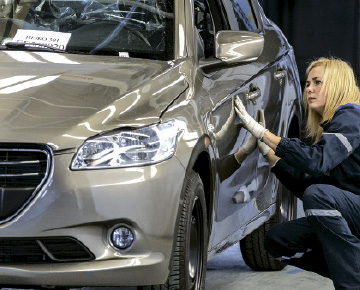
Two models are in production: a mid-class Peugeot 301 sedan and hybrid Peugeot 3008, with the Peugeot Partner and new business class sedan Peugeot 508 due to come on the market in March, alongside two Citroen models. However, at present, it primarily refers to SKD assembly, when all components, including ready painted bodies, are imported from abroad. Meanwhile, within two years, Obchak will have its own welding and painting shops. Meanwhile, manufacturing capacity is to rise to 25,000 cars annually.
Of course, consumers are more excited about price and quality than volumes. Mr. Pikul admits, “The fact that the second largest European motor-car manufacturer has entrusted a Belarusian factory with assembly of its cars, speaks volumes. Importantly, employees are responsible for quality control, so they must pass training at PSA Peugeot Citroen factories in France and Russia.”
At the Minsk automobile salon’s sales department, prices were revealed for the Peugeot 301 sedan (comparable in class to the Skoda Rapid, Kia Rio, Volkswagen Polo, and Hyundai Solaris). Starting at $11,890 for the basic model, a hybrid will cost at least $19,000, against $10,290 and $12,490 for the Geely LC Cross and Geely SC7, assembled in Borisov. The all-terrain Geely Emgrand EX7 costs $17,990.
Although the prices are modest, it’s noticeable that similar brands in Russia are approximately $1,500 cheaper. The Director for Marketing, Valentin Trigorlov, stresses that the situation is temporary, as Russian importers are keen to unload last year’s stock, using low prices to do so, despite the Russian Rouble being twice devalued. He notes, “The cost of cars will inevitably rise in Russia, as sellers cannot operate at a loss. Our prices will then be more attractive, making it more likely that Russians will buy from us, than that we will go to Russia to buy cars.”
Alongside Peugeot Citroen, our country has been assembling Chinese Geely cars at joint venture BelGee for the past two years. As to whether Peugeot Citroen is afraid of competition from Chinese cars, Mr. Trigorlov stresses, “Each brand has own fans, so we expect normal market competition. Naturally, we’ll keep expanding our range, first adding the Peugeot 508 (with 150-hp engine and six-speed automatic gearbox). The basic cost will be 20,500 Euros for this high-performance car, which ranks alongside the Volkswagen Passat and Toyota Camry, while being much cheaper.”
Without doubt, a key factor in the success of a car is marketing, since sales must be forthcoming. The capacity of the domestic market is very small, while Russia currently assembles about 30 brands. Obviously, they won’t be glad to see new players enter the market, since competition is already high. However, the Director General of Unison is optimistic, saying, “The French concern has its own vision of the market. Looking at expanding our range, increasing volumes of output and possible deliveries to the Russian market, we need a marketing strategy.”
Sergey Varivoda, an expert in the field of car sales, emphasises, “Assembly of Peugeot Citroen is directed at the home market. Inherently, it is a hidden import, attempting to bypass the high level of customs duties and utilisation fees. Probably, such savings make even SKD assembly effective for a small number of cars. However, entry to foreign markets without serious localisation of manufacturing is impossible. In order to reach 50 percent localisation, it’s necessary that we produce our own engines and other large units: the gearbox or rear axle. BelGee is yet to begin manufacture of Geely bodies and it’s unlikely to be achieved within the next two years. There’s high probability that the project will fail, and the same applies to Unison enterprise.”
Is the future really so gloomy? After all, we make good buses, trolley buses, trams and trucks. What prevents us from making a bold push in the automobile industry?
The Deputy Director for Scientific Work at the Joint Institute of Mechanical Engineering of the National Academy of Sciences of Belarus, Vladimir Algin, underlines, “Technically, I see no problems, as we have highly skilled personnel. Of course, we cannot ignore global trends. In co-operation with the French and the Chinese, who have their own brands, we could occupy a niche within the Eurasian Economic Union.”
The Chairman of the Belarusian Automobile Association, Sergey Mikhnevich, adds, “I’d like to believe that our car industry has a future, since there seems no reason to worry about the quality of assembly. Unison is meeting Peugeot Citroen standards. The price of our cars is as it should be and we are generating additional jobs. Ultimate success depends on whether we can find alternative markets.”
By Konstantin Yevgenjev











